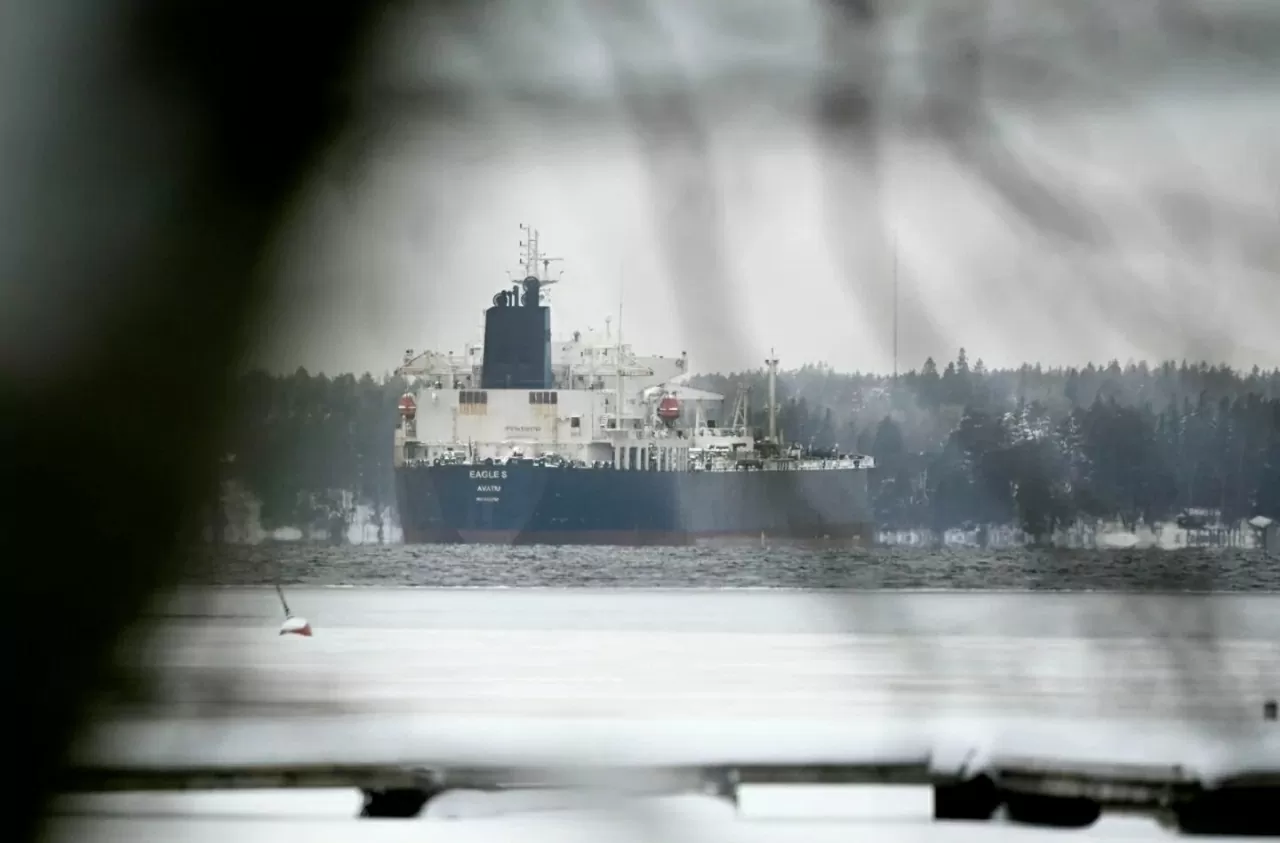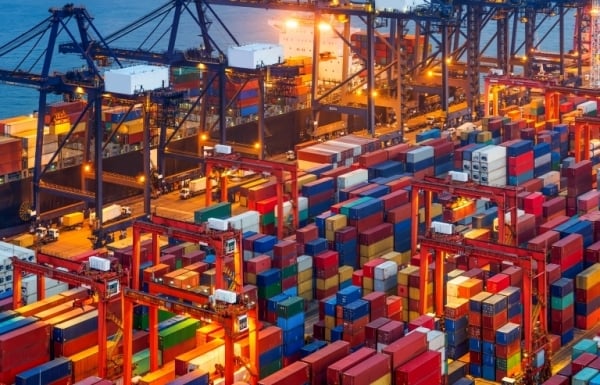The full picture of the impact of US sanctions on Russian oil exports is still unclear, however, some important conclusions can already be drawn.
 |
| To weaken Russia's "dark fleet" and prevent US President Donald Trump from easing sanctions, on January 10, 2025, the outgoing administration of President Joe Biden significantly tightened sanctions on Russia's energy sector. (Illustration photo - Source: Scanpix) |
Despite being the world's most sanctioned country, Russia's hydrocarbon export sector has performed quite well recently. In 2024, Moscow's oil and gas revenue increased by 26% to a record high of nearly 11.1 trillion rubles.
However, in 2023, oil and gas revenues to the Russian budget fell by 24% due to falling oil prices and gas exports. In 2024, oil and oil products accounted for a quarter of Russia's federal budget revenues, while gas contributed another 5%.
Russia’s budget will only increase with the addition of oil and gas revenues in 2022, which will be around 11.5 trillion rubles. At that time, oil prices have skyrocketed due to market expectations and Moscow’s military campaign in Ukraine (February 2022). For many months of that year, the price of Russian Urals crude has been above $80 a barrel.
According to the International Energy Agency (IEA), in January 2025, Russia's oil production even increased slightly compared to December 2024, from 9.12 to 9.22 million barrels per day. In addition, in the first month of this year, the country's revenue from oil and oil products exports increased by $900 million (90 billion rubles) compared to the previous month, reaching $15.8 billion (1.6 trillion rubles). The volume of oil and oil products exports remained unchanged, but the average price per barrel of oil exceeded the ceiling of $60 per barrel.
Oil price ceiling no longer effective
All of this suggests that sanctions on Russia’s energy sector, which were the most extensive sanctions in place until early 2025, have no significant impact on oil prices or the country’s oil budget revenues.
The price ceiling for Russian oil was set by the European Union (EU), the Group of Seven (G7) and Australia on December 5, 2022, coinciding with the implementation of the ban on shipping oil. Accordingly, Western shipping lines, insurance companies, etc. can only transport and insure Russian oil sold to third countries if the oil price is below $60/barrel at the loading port.
Initially, the price cap significantly reduced Russia’s oil revenues. For example, the Center for Research on Energy and Clean Air (CREA) estimates that in the first year of the embargo and price cap, Russia lost about 23 percent of its monthly income from Urals crude exports.
However, by the second year, this figure had dropped to 9%. The reason is believed to be that Moscow exporters began to widely use a fleet of “shadow” vessels to conceal the origin of goods, such as transferring goods from one ship to another at sea, turning off the Automatic Identification System (AIS), providing false data, etc.
To weaken this Russian fleet and prevent the possibility of US President Donald Trump easing sanctions, on January 10, 2025, the outgoing administration of President Joe Biden significantly tightened sanctions on Russia's energy sector.
Impact of US sanctions
Sanctions were imposed on several units of Russia's largest oil company, Rosneft (specifically the Arctic project - Vostok Oil), which accounts for about 40% of the country's total production, as well as the Gazprom Neft, Surgutneftegas and their subsidiaries, dozens of oil trading and insurance companies, and 184 vessels of the Russian fleet, mostly tankers.
The Biden administration also imposed new restrictions on nearly a hundred individuals previously sanctioned. It is unlikely that easing sanctions on Moscow will benefit President Trump, who wants to end the conflict in Ukraine. The US leader has promised that if Russia is not willing to negotiate, the sanctions list will be expanded.
Russian exporters have a small grace period: sanctioned vessels can unload oil at their destination until February 27, and financial transactions must be completed by March 12. For this reason, the full picture of how US sanctions affect Russia remains unclear. However, some important conclusions can already be drawn.
The new US sanctions have yet to cause a spike in oil prices. Brent crude oil prices rose from $77 a barrel the day before the US sanctions announcement (January 9) to $82 a barrel on January 15, but by early February, they had fallen to $74 a barrel.
Meanwhile, the price of Russia's main oil grade, Urals, fell below the ceiling of $60 a barrel in early February. As a result, the discount on Russian oil increased to $15-16 a barrel - the highest since May 2024. Before the conflict in Ukraine broke out, this figure usually did not exceed $2-3 a barrel.
Another significant impact of the new US sanctions is the grounding of some oil tankers. Specifically, about 60% of the active oil tankers (94) listed on the US blacklist as of January 10 have been grounded. Many of the vessels are actually being used as oil storage.
According to Bloomberg , Russia managed to load 21 oil tankers from February 2 to 9, compared to 29 the previous week. Oil exports have dropped significantly, both in volume (down to 2.3 million barrels per day, down 25% from the previous week) and in revenue (down to $990 million, down 28% from the previous week), a level not seen since December 2022.
Theoretically, Moscow could reduce crude exports and increase refining volumes. Russian Deputy Prime Minister Alexander Novak has announced his intention to increase refining by 2025. However, this is facing problems due to the continuous drone attacks from Ukraine.
According to Reuters estimates, drone attacks destroyed about 10% of Russia's oil refining capacity between January and early February 2025. In addition, Russia's oil storage capacity is limited and is also under attack.
 |
| Sanctions on Russia's energy sector, which were the most extensive sanctions in place until early 2025, have no significant impact on oil prices or the country's oil budget revenues. (Source: Getty Images) |
China, India and Türkiye will not take the risk
In 2021, the EU was the largest buyer of Russian oil and oil products, accounting for nearly half of the country's exports. However, due to the embargo on Russian oil and oil products by sea, the bloc's purchases fell sharply in 2024.
In 2023-2024, China, India and Türkiye were the largest buyers of Russian oil and oil products, accounting for about 70% of Russia's exports. These countries, considered Moscow's allies, saved Russian oil exports from collapsing following the EU embargo.
However, these countries are not ready to “play” with the new US sanctions. The Indian government has announced that it will not allow sanctioned oil tankers to enter its ports after February 27. China and Turkey are also cautious about sanctioned oil tankers.
According to current estimates, the South Asian country is about 14% short of its planned oil imports in March. Its partners are still hoping to secure cheap Russian oil supplies.
Notably, before the Ukraine conflict, New Delhi bought only a few percent of its oil imports from Russia, but by 2024 that figure had risen to about a third. And a return to more expensive Middle Eastern oil is undesirable. However, Indian refiners and banks have to take into account US sanctions, since they use Western financial markets.
Meanwhile, Chinese refiners are also cutting back on Russian crude even faster than India. Imports from the Northeast Asian country are expected to fall to 500,000 barrels per day in February, down from an average of 1.05 million barrels per day in the previous three months. China is replacing Russian supplies with those from Angola and Brazil.
Russia's Arctic ambitions are under threat
Particularly affected could be Russia’s Arctic oil projects, all of which are currently exported. At least 15 ships subject to US sanctions are transporting Arctic oil.
Additionally, shipments from Arctic and Sakhalin ports require specialized tankers capable of operating in harsh conditions. Finding replacements for sanctioned vessels will be extremely difficult.
Also subject to sanctions is Rosneft’s flagship project, Vostok Oil, considered one of Russia’s most promising hydrocarbon projects in the Arctic. Vostok Oil is scheduled to begin production in 2024, initially at 30 million tonnes per year, rising to 100 million tonnes per year by 2030, equivalent to about a fifth of Russia’s current oil output.
However, the project has been significantly affected by Western sanctions, including technology sanctions, and the commissioning of the first phase has been postponed from 2024 to 2026.
Russia’s ability to avoid or reduce its exports to as low as possible from March 2025 depends on whether it can rebuild new supply programs before March: exporters, insurers and tankers not blacklisted by the US must have a way to make payments. Of course, many parties involved in these chains have not yet been affected by sanctions. Moreover, new players in the market are being signed up in a hurry.
Russia’s oil export revenues depend on whether the US continues to expand its sanctions list at the same pace as it did in January. Another question is whether Europe will finally decide to lower its oil price ceiling to put more pressure on Moscow’s budget revenues.
Two days after the US sanctions were announced, six EU countries (Sweden, Denmark, Finland, Latvia, Lithuania and Estonia) called on the European Commission to lower the price ceiling on Russian oil to reduce the Kremlin’s income. According to CREA’s estimates, a price ceiling of $30 per barrel would reduce Moscow’s oil export revenue by 23% in January.
Over time, Russia will find ways to adapt to the “farewell sanctions” imposed by the Biden administration, although it is likely that Moscow will have to reduce its oil production in the near future. However, if Western countries continue to tighten sanctions, adapting will become increasingly costly for Russia.
Source: https://baoquocte.vn/xuat-khau-dau-nga-sau-lenh-trung-phat-chia-tay-nhiem-ky-cua-ong-biden-tong-thong-trump-se-nuong-tay-hay-siet-them-moscow-trong-cay-dong-minh-304964.html
































Comment (0)